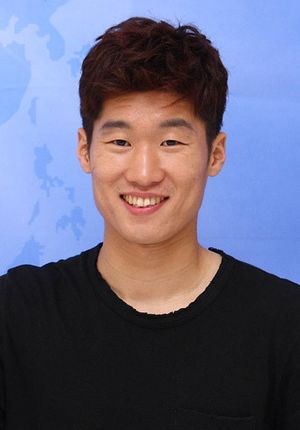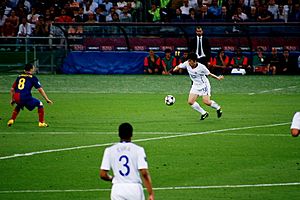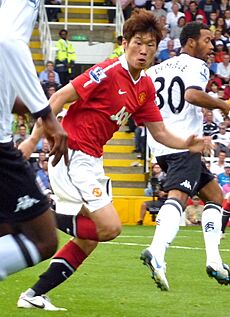Park Ji-sung facts for kids

Park at the G-20 Seoul Summit in 2010
|
|||||||||||||||||||||||||
| Personal information | |||||||||||||||||||||||||
|---|---|---|---|---|---|---|---|---|---|---|---|---|---|---|---|---|---|---|---|---|---|---|---|---|---|
| Full name | Park Ji-sung | ||||||||||||||||||||||||
| Date of birth | 25 February 1981 | ||||||||||||||||||||||||
| Place of birth | Seoul, South Korea | ||||||||||||||||||||||||
| Height | 1.75 m (5 ft 9 in) | ||||||||||||||||||||||||
| Position(s) | Midfielder | ||||||||||||||||||||||||
| Team information | |||||||||||||||||||||||||
|
Current team
|
Jeonbuk Hyundai Motors (advisor) | ||||||||||||||||||||||||
| Youth career | |||||||||||||||||||||||||
| 1993–1995 | Anyong Middle School | ||||||||||||||||||||||||
| 1996–1998 | Suwon Technical High School | ||||||||||||||||||||||||
| College career | |||||||||||||||||||||||||
| Years | Team | Apps | (Gls) | ||||||||||||||||||||||
| 1999–2000 | Myongji University | ||||||||||||||||||||||||
| Senior career* | |||||||||||||||||||||||||
| Years | Team | Apps | (Gls) | ||||||||||||||||||||||
| 2000–2003 | Kyoto Purple Sanga | 76 | (11) | ||||||||||||||||||||||
| 2003–2005 | PSV Eindhoven | 65 | (13) | ||||||||||||||||||||||
| 2005–2012 | Manchester United | 134 | (19) | ||||||||||||||||||||||
| 2012–2014 | Queens Park Rangers | 20 | (0) | ||||||||||||||||||||||
| 2013–2014 | → PSV Eindhoven (loan) | 23 | (2) | ||||||||||||||||||||||
| Total | 318 | (45) | |||||||||||||||||||||||
| International career | |||||||||||||||||||||||||
| 2000 | South Korea U20 | 2 | (0) | ||||||||||||||||||||||
| 1999–2004 | South Korea U23 | 24 | (2) | ||||||||||||||||||||||
| 2000–2011 | South Korea | 100 | (13) | ||||||||||||||||||||||
|
Medal record
|
|||||||||||||||||||||||||
|
|||||||||||||||||||||||||
| *Club domestic league appearances and goals | |||||||||||||||||||||||||
Park Ji-sung (born February 25, 1981) is a famous South Korean former professional footballer who played as a midfielder. He is considered one of the best Asian football players in history, winning 19 trophies during his career.
Park was the first Asian player to win the UEFA Champions League, play in a Champions League final, and win the FIFA Club World Cup. He was known for his amazing fitness, hard work, and smart movement on the field. His incredible stamina earned him the nickname "Three-Lung" Park.
He started his career in South Korea and Japan before moving to Europe. He played for PSV Eindhoven in the Netherlands and then for Manchester United in England. At Manchester United, he won four Premier League titles and the Champions League. He later played for Queens Park Rangers before retiring.
Park also played for the South Korea national team 100 times, scoring 13 goals. He helped his country finish fourth at the 2002 FIFA World Cup and scored goals in three different World Cups.
Contents
Early Life and Start in Football
Park Ji-sung was born in Seoul, the capital of South Korea. He grew up in Suwon, a nearby city, where he started playing football in elementary school. He was a very promising young player, known for his hard work and dribbling skills.
However, Park was smaller than many other players, which made it hard for him to get noticed by big clubs and universities. His father, Park Sung-jong, even quit his job to open a butcher shop to help his son. He fed Park different kinds of meat, hoping it would help him become stronger.
Despite being rejected by many teams, his high school coach strongly recommended him to Myongji University. The university's football team was full, so he joined the tennis club at first. The football coach, Kim Hee-tae, saw his talent during a training session with the South Korean Olympic team and decided to give him a chance.
At just 18 years old, Park was chosen for the Olympic team. This was a huge surprise to everyone. On April 5, 2000, he played his first game for the senior national team. Soon after, a Japanese club, Kyoto Purple Sanga, offered him a contract, and his professional career began.
Club Career
Kyoto Purple Sanga
In 2000, Park joined Kyoto Purple Sanga in Japan. The team's coach, Bunji Kimura, had come to Korea to scout another player but was impressed by Park's talent in a practice game.
In 2001, Park helped his team win the second-division J2 League title, which promoted them to the top-division J1 League. In 2002, he led the team to the final of the Emperor's Cup. In the final match, he scored a key goal, and his team won 2–1. It was the first time the club had ever won the cup. This was his last game for the team before he moved to Europe.
PSV Eindhoven
In 2003, Park moved to the Dutch club PSV Eindhoven. He was invited by his former national team coach, Guus Hiddink. At first, Park struggled with injuries and had a hard time adjusting. Fans were sometimes critical of his performance.
However, by the 2004–05 season, Park became a key player for PSV. He was part of a strong midfield and helped the team with many goals and assists. A major highlight was when he scored against the Italian team Milan in the UEFA Champions League semi-finals. His great performances made him a fan favorite, and they even wrote a song for him called "Song for Park."
Manchester United
First Seasons in England
In July 2005, Park joined one of the biggest clubs in the world, Manchester United, for a fee of £4 million. He became the second East Asian player to sign for the club.
On October 18, 2005, he became the first Asian player to be the captain of Manchester United during a Champions League match. He scored his first official league goal on April 9, 2006, in a 2–0 win against Arsenal.
During the 2006–07 season, Park suffered a serious knee injury that required surgery in the United States. Even though he missed much of the season, he still scored five goals and earned a Premier League winner's medal.
Champions League Success
In the 2007–08 season, Park helped Manchester United reach the Champions League Final. Although he played a big role in the semi-finals against Barcelona, he was not included in the squad for the final match against Chelsea. The manager, Sir Alex Ferguson, later said it was one of the hardest decisions of his career.

The next season, Park continued to be an important player. On May 5, 2009, he scored a goal against Arsenal in the Champions League semi-final. This helped United reach the final for the second year in a row. This time, Park played in the final, becoming the first Asian player ever to do so. Unfortunately, Manchester United lost 2–0 to Barcelona.
Later Years at United
Park signed a new contract in 2009 and continued to be a reliable player for Manchester United. He was known for scoring important goals in big matches, especially against rivals like Arsenal and Liverpool. Fans and teammates valued his hard work and team spirit.

In the 2010–11 season, he had one of his best periods at the club, scoring several key goals and winning the club's Player of the Month award twice in a row. He played in another Champions League final in 2011, again against Barcelona, but United lost 3–1.
On February 5, 2012, Park played his 200th game for Manchester United. He became the 92nd player in the club's history to reach this milestone.
Queens Park Rangers and Retirement
In July 2012, Park moved to Queens Park Rangers (QPR) to get more playing time. He was named the club captain, but his season was affected by injuries and poor form. QPR was relegated from the Premier League at the end of the season.
The next season, Park returned to PSV Eindhoven on loan. He scored a goal in his second match back with the team.
On May 14, 2014, Park announced his retirement from football because of ongoing problems with his knee. He said, "I'm leaving with no regrets. I have achieved more than I thought I would."
International Career
Park played for South Korea's national teams from a young age. He was a key player in the 2002 FIFA World Cup, which was co-hosted by South Korea and Japan.
In the final group stage match against Portugal, Park scored a famous winning goal. He controlled the ball with his chest, beat a defender, and shot the ball into the net. This goal sent South Korea to the knockout stage for the first time ever. The team went on to reach the semi-finals, the best result ever for an Asian team.
Park also played in the 2006 FIFA World Cup, where he scored a goal against France. In the 2010 FIFA World Cup, he became the captain of the team. He scored a goal against Greece, making him the first Asian player to score in three different World Cups.
After the 2011 AFC Asian Cup, where he played his 100th and final game for his country, Park retired from international football.
Style of Play
Park was famous for his incredible energy and work rate. He could play in many different positions in the midfield. He was often called a "big game player" because his managers trusted him in the most important matches. His main job was often to press opponents and win the ball back for his team.
Former teammate Wayne Rooney said that Park was just as important to Manchester United's success as stars like himself and Cristiano Ronaldo. Italian player Andrea Pirlo once wrote that Park was one of the toughest opponents he ever faced because he never stopped running.
Life After Football
After retiring, Park has stayed involved in football. In 2014, he became a global ambassador for Manchester United. He also studied sports management and earned a master's degree.
In 2021, he joined the South Korean club Jeonbuk Hyundai Motors as an advisor and later became the technical director. He has also worked as a football commentator for a South Korean TV channel.
Park founded the JS Foundation, a charity that helps support young football players. He is married to Kim Min-ji, a former television reporter, and they have a daughter and a son.
Career statistics
Club
| Club | Season | League | National cup | League cup | Continental | Other | Total | |||||||
|---|---|---|---|---|---|---|---|---|---|---|---|---|---|---|
| Division | Apps | Goals | Apps | Goals | Apps | Goals | Apps | Goals | Apps | Goals | Apps | Goals | ||
| Kyoto Purple Sanga | 2000 | J1 League | 13 | 1 | 1 | 0 | 2 | 0 | — | — | 16 | 1 | ||
| 2001 | J2 League | 38 | 3 | 1 | 0 | 1 | 0 | — | — | 40 | 3 | |||
| 2002 | J1 League | 25 | 7 | 4 | 1 | 0 | 0 | — | — | 29 | 8 | |||
| Total | 76 | 11 | 6 | 1 | 3 | 0 | — | — | 85 | 12 | ||||
| PSV Eindhoven | 2002–03 | Eredivisie | 8 | 0 | 0 | 0 | — | — | — | 8 | 0 | |||
| 2003–04 | Eredivisie | 28 | 6 | 1 | 0 | — | 10 | 0 | 1 | 0 | 40 | 6 | ||
| 2004–05 | Eredivisie | 28 | 7 | 3 | 2 | — | 13 | 2 | — | 44 | 11 | |||
| Total | 65 | 13 | 4 | 2 | — | 23 | 2 | 1 | 0 | 92 | 17 | |||
| Manchester United | 2005–06 | Premier League | 34 | 1 | 2 | 0 | 3 | 1 | 6 | 0 | — | 45 | 2 | |
| 2006–07 | Premier League | 14 | 5 | 5 | 0 | 0 | 0 | 1 | 0 | — | 20 | 5 | ||
| 2007–08 | Premier League | 12 | 1 | 2 | 0 | 0 | 0 | 4 | 0 | 0 | 0 | 18 | 1 | |
| 2008–09 | Premier League | 25 | 2 | 3 | 1 | 1 | 0 | 9 | 1 | 2 | 0 | 40 | 4 | |
| 2009–10 | Premier League | 17 | 3 | 0 | 0 | 2 | 0 | 6 | 1 | 1 | 0 | 26 | 4 | |
| 2010–11 | Premier League | 15 | 5 | 1 | 0 | 2 | 2 | 9 | 1 | 1 | 0 | 28 | 8 | |
| 2011–12 | Premier League | 17 | 2 | 1 | 1 | 3 | 0 | 7 | 0 | 0 | 0 | 28 | 3 | |
| Total | 134 | 19 | 14 | 2 | 11 | 3 | 42 | 3 | 4 | 0 | 205 | 27 | ||
| Queens Park Rangers | 2012–13 | Premier League | 20 | 0 | 3 | 0 | 2 | 0 | — | — | 25 | 0 | ||
| PSV Eindhoven (loan) | 2013–14 | Eredivisie | 23 | 2 | 0 | 0 | — | 4 | 0 | — | 27 | 2 | ||
| Career total | 318 | 45 | 27 | 5 | 16 | 3 | 69 | 5 | 5 | 0 | 434 | 58 | ||
International
| National team | Year | Apps | Goals |
|---|---|---|---|
| South Korea | 2000 | 15 | 1 |
| 2001 | 10 | 0 | |
| 2002 | 15 | 3 | |
| 2003 | 1 | 0 | |
| 2004 | 8 | 0 | |
| 2005 | 8 | 1 | |
| 2006 | 8 | 1 | |
| 2007 | 2 | 0 | |
| 2008 | 7 | 3 | |
| 2009 | 10 | 2 | |
| 2010 | 11 | 2 | |
| 2011 | 5 | 0 | |
| Career total | 100 | 13 | |
Honours
Kyoto Purple Sanga
- J2 League: 2001
- Emperor's Cup: 2002
PSV Eindhoven
- Eredivisie: 2002–03, 2004–05
- KNVB Cup: 2004–05
- Johan Cruyff Shield: 2003
Manchester United
- Premier League: 2006–07, 2007–08, 2008–09, 2010–11
- Football League Cup: 2005–06, 2008–09, 2009–10
- FA Community Shield: 2010, 2011
- UEFA Champions League: 2007–08
- FIFA Club World Cup: 2008
South Korea U23
- Asian Games bronze medal: 2002
South Korea
- AFC Asian Cup third place: 2000, 2011
Individual
- AFC Asian Cup Quality Player: 2011
- Korean FA Goal of the Year: 2002, 2010
- Korean FA Player of the Year: 2010
- K League All-Star Game Most Valuable Player: 2014
- MLS All-Star Game Most Valuable Player: 2011
See also
 In Spanish: Park Ji-sung para niños
In Spanish: Park Ji-sung para niños
- List of men's footballers with 100 or more international caps
 | May Edward Chinn |
 | Rebecca Cole |
 | Alexa Canady |
 | Dorothy Lavinia Brown |

